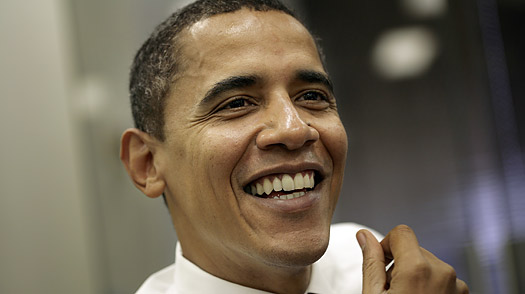
(2 of 6)
But crisis has a way of ushering even great events into the past. As Obama has moved with unprecedented speed to build an Administration that would bolster the confidence of a shaken world, his flash and dazzle have faded into the background. In the waning days of his extraordinary year and on the cusp of his presidency, what now seems most salient about Obama is the opposite of flashy, the antithesis of rhetoric: he gets things done. He is a man about his business — a Mr. Fix It going to Washington. That's why he's here and why he doesn't care about the furniture. We've heard fine speechmakers before and read compelling personal narratives. We've observed candidates who somehow latch on to just the right issue at just the right moment. Obama was all these when he started his campaign: a talented speaker who had opposed the Iraq war and lived a biography that was all things to all people. But while events undermined those pillars of his candidacy, making Iraq seem less urgent and biography less relevant, Obama has kept on rising. He possesses a rare ability to read the imperatives and possibilities of each new moment and organize himself and others to anticipate change and translate it into opportunity. (See pictures of Obama's nation of hope.)
The real story of Obama's year is the steady march of seemingly impossible accomplishments: beating the Clinton machine, organizing previously marginal voters, harnessing the new technologies of democratic engagement, shattering fundraising records, turning previously red states blue — and then waking up the day after his victory to reinvent the presidential-transition process in the face of a potentially dangerous vacuum of leadership. "We always did our best up on the high wire," says his campaign manager, David Plouffe.
Obama's competence fills him with a genuine self-confidence. "I've got a pretty healthy ego," he allows. That's clear when he offers a checklist for voters to use in judging his performance two years from now. It's quite an agenda. Listen: "Have we helped this economy recover from what is the worst financial crisis since the Great Depression? Have we instituted financial regulations and rules of the road that assure this kind of crisis doesn't occur again? Have we created jobs that pay well and allow families to support themselves? Have we made significant progress on reducing the cost of health care and expanding coverage? Have we begun what will probably be a decade-long project to shift America to a new energy economy? Have we begun what may be an even longer project of revitalizing our public-school systems?"
There's more: "Have we closed down Guantánamo in a responsible way, put a clear end to torture and restored a balance between the demands of our security and our Constitution? Have we rebuilt alliances around the world effectively? Have I drawn down U.S. troops out of Iraq, and have we strengthened our approach in Afghanistan — not just militarily but also diplomatically and in terms of development? And have we been able to reinvigorate international institutions to deal with transnational threats, like climate change, that we can't solve on our own?"
And: "Outside of specific policy measures, two years from now, I want the American people to be able to say, 'Government's not perfect; there are some things Obama does that get on my nerves. But you know what? I feel like the government's working for me. I feel like it's accountable. I feel like it's transparent. I feel that I am well informed about what government actions are being taken. I feel that this is a President and an Administration that admits when it makes mistakes and adapts itself to new information.'"
Can he really achieve all that? Plenty of voters will be happy if he aces only Item 1 on his list. But the essence of both Obama's strength and his promise is that, according to a recent poll, a strong majority of Americans believe he will accomplish most of what he aims to do. For having the confidence to sketch that kind of future in this gloomy hour and for showing the competence that makes Americans hopeful that he will pull it off, Barack Obama is Time's Person of the Year for 2008.
I. Simple Competence
In some tellings, Obama's journey to the white house started with his little-noticed but carefully nuanced speech against the Iraq war in 2002. In other versions, it began with his electrifying address to the Democratic Convention in 2004. Those moments blazed with potential, true, but something more was necessary: a certain appetite among the electorate. The country had to be hungry for the menu he offered, and in that sense, his path's true beginning lay in the drowned precincts of New Orleans in the sweltering, desperate late summer of 2005.
Hurricane Katrina blew away the last gauzy veil from an ugly specter of executive incompetence in American politics. When the people of New Orleans needed leadership, the Republican Administration in Washington proved useless. The Democratic governor and mayor were pitiful. At long last, our government was united — but under an appalling banner of fecklessness. The moral bankruptcy of the spin doctors was laid bare: no soul remained gullible enough to believe that Brownie was doing a heckuva job.
After Katrina, demand collapsed for the very qualities that Obama lacked as a candidate: empty boasts, finger-pointing, backstabbing and years of experience inside a government that couldn't deliver bottled water to the stranded citizens of a major U.S. city. Spare us the dead-or-alive bravado, the gates-of-hell bluster, the melodrama of the 3 a.m. phone call. A door swung open for a candidate who would merely stand and deliver. Simple competence — although there's nothing simple about it, not in today's intricate, interdependent, interwoven, intensely dangerous world.